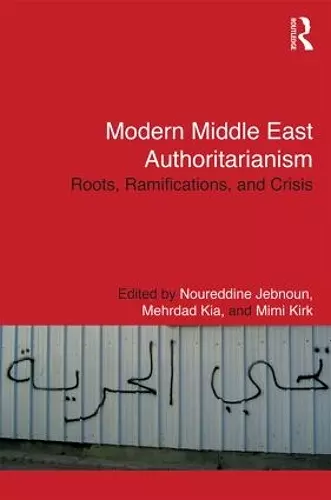Modern Middle East Authoritarianism
Roots, Ramifications, and Crisis
Mehrdad Kia editor Noureddine Jebnoun editor Mimi Kirk editor
Format:Hardback
Publisher:Taylor & Francis Ltd
Published:26th Jul '13
Currently unavailable, and unfortunately no date known when it will be back
This hardback is available in another edition too:
- Paperback£49.99(9781138929654)

While the Arab uprisings have overturned the idea of Arab "exceptionalism," or the acceptance of authoritarianism, better analysis of authoritarianism’s resilience in pre- and post-uprising scenarios is still needed. Modern Middle East Authoritarianism:Roots, Ramifications, and Crisis undertakes this task by addressing not only the mechanisms that allowed Middle Eastern regimes to survive and adapt for decades, but also the obstacles that certain countries face in their current transition to democracy.
This volume analyzes the role of ruling elites, Islamists, and others, as well as variables such as bureaucracy, patronage, the strength of security apparatuses, and ideological legitimacy to ascertain regimes’ life expectancies and these factors’ post-uprisings repercussions. Discussing not only the paradigms through which the region has been analyzed, but also providing in-depth case studies of Tunisia, Egypt, Libya, Algeria, Saudi Arabia, Iraq, and Iran, the authors arrive at critical conclusions about dictatorship and possibilities for its transformation.
Employing diverse research methods, including interviews, participant observation, and theoretical discussions of authoritarianism and political transition, this book is essential reading for scholars of Middle East Studies, Islamic Studies and those with an interest in the governance and politics of the Middle East.
"The Arab uprisings of 2011 have forced scholars of the region to rethink arguments about the durability of authoritarianism and the prospects for democratic change in the Middle East. This volume is an important contribution to this necessary rethinking. Its chapters offer valuable insight into the complex and evolving political landscape that is taking shape in the Middle East today following the mass protests that forced four Arab autocrats from power, and left their counterparts elsewhere in region uneasy about their own survival."
Steven Heydemann, Special Adviser for Middle East Initiatives, United States Institute of Peace
"This fine collection, nicely introduced by Noureddine Jebnoun, features timely analyses by seasoned scholars, including several with a wealth of recent field experience in the Middle East. Particularly impressive are sage assessments by Clement M. Henry, Michael C. Hudson and Eric Davis, but case studies by a number of the authors are also of high quality. This is an indispensable volume for understanding the authoritarian political context in which the Arab Awakening began in late 2010. In addition, three noteworthy contributions on Iran expand the substantive canvas. At a time when on-the-fly books on the "Arab Spring" vie for attention, this volume offers more durable scholarship."
Professor Augustus Richard Norton, Boston University, USA"Modern Middle East Authoritarianism: Roots, Ramifications, and Crisis is an exceptional addition to the existing body of scholarship on authoritarianism in the Middle East, and in general. It accurately reflects the various dynamics that animate authoritarian governments in the region and offers an astute set of observations about the origins and persistence of this phenomenon. Its relevance and rigor make it a useful tool for students of Middle Eastern politics and history, while its clear assessments of policy render it a necessary resource for policy makers. Many have come close to producing a book of this caliber, but few have patiently labored through analyses of a region swirling in change and delivered a product that may well become a staple of its discipline. The editors and contributors of this volume have done just that."
Nathan Lean, writer and scholar on the Middle East
ISBN: 9780415845007
Dimensions: unknown
Weight: 740g
304 pages